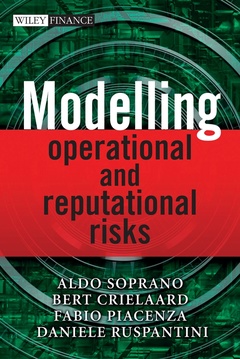Measuring operational & reputational risks: a practitioners approach A Practitioner′s Approach The Wiley Finance Series, Vol. 448
Auteurs : Soprano Aldo, Crielaard Bert, Piacenza Fabio, Ruspantini Daniele

Foreword by Alessandro Profumo
Preface
Acknowledgments
1 The development of ORM in UniCredit Group
1.1 A brief history of a fast growing group
1.2 Creating a new function
1.3 Developing a control system
1.4 Challenges in the early stages
1.5 Methodology to measure operational risk
1.6 Training and internal communication focus
1.7 International regulatory challenges
1.8 Reputational risk management
2 The calculation dataset
2.1 Definitions
2.2 Rules of thumb
2.3 Internal loss data
2.4 Minimum loss threshold
2.5 External data
2.6 Business environment and internal control factors
2.7 Scenarios
2.8 Insurance information
2.9 Scaling data
2.10 The Unicredit Group Operational Risk database evolution
2.11 Final considerations
3 Loss distribution approaches
3.1 Calculation dataset building
3.2 General LDA framework
3.3 Operational risk classes
3.4 Parametric estimation and goodness of fit techniques
3.5 Applying extreme value theory
3.6 g and h distribution theory
3.7 Calculating operational capital at risk
3.8 Insurance modeling
3.9 Adjustment for risk indicators
3.10 Operational risk classes aggregation
3.11 The closed form approximation for OpVaR
3.12 Confidence band for capital at risk
3.13 Stress testing
3.14 Loss data minimum threshold setting
3.15 Empirical application on fitch OpData
3.16 Regulatory capital requirement
3.17 Economic capital requirement
3.18 Integration of operational risk in the budgeting process
4 Analyzing insurance policies
4.1 The role of insurance and risk transfer in risk management
4.2 Qualifying criteria in the Basel 2 capital framework
4.3 A Practical application to traditional insurance
5 Managing reputational risk
5.1 Introducing reputational risk
5.2 A Financial institutions reputational risk exposure
5.3 Managing reputational risk: a matter of policy
5.4 Reputational Risk Measurement
5.5 A Recent example that shocked the industry: Société Générale
6 Conclusions
References
Further reading
Index
BERT CRIELAARD works in the Operational Risk Department of UniCredit (Holding) and is group-wide responsible for operational risk management in the Corporate, Private Banking and Asset Management business divisions. Previously he worked in the insurance and asset management industry in Italy and the Netherlands. He is (co-)author of articles on insurance in risk management.
FABIO PIACENZA is a senior quantitative analyst at UniCredit Group Operational Risk Management in Milan. Graduated in mathematics, he is author of several articles on operational risk related topics.
DANIELE RUSPANTINI works in UniCredit Group Milan in the Operational Risk Management team, graduated in mathematics, he is co author of articles on quantitative risk management.
Date de parution : 04-2009
Ouvrage de 288 p.
16x23.6 cm
Thème de Measuring operational & reputational risks: a... :
Mots-clés :
guide; undertaken; practitioners; process; risk; greatest; generic; operational; faced; group; challenges; definition; managers; first; function; unicredit; dedicated; monitor; multitude; risks; variety; functions; processes



